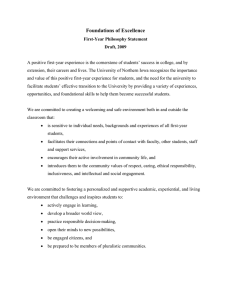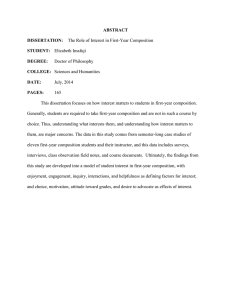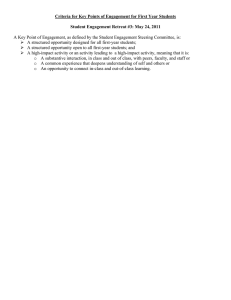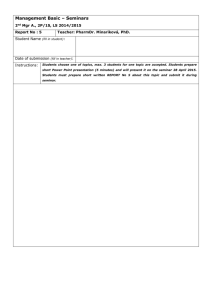General Education Requirements
advertisement
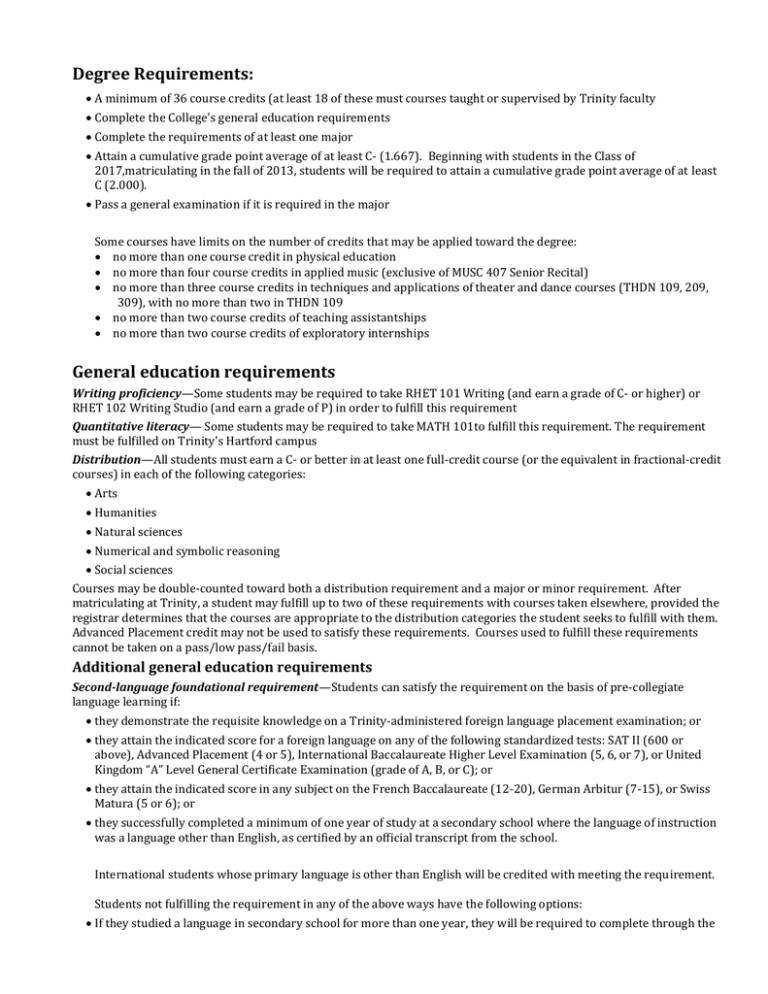
Degree Requirements: A minimum of 36 course credits (at least 18 of these must courses taught or supervised by Trinity faculty Complete the College’s general education requirements Complete the requirements of at least one major Attain a cumulative grade point average of at least C- (1.667). Beginning with students in the Class of 2017,matriculating in the fall of 2013, students will be required to attain a cumulative grade point average of at least C (2.000). Pass a general examination if it is required in the major Some courses have limits on the number of credits that may be applied toward the degree: no more than one course credit in physical education no more than four course credits in applied music (exclusive of MUSC 407 Senior Recital) no more than three course credits in techniques and applications of theater and dance courses (THDN 109, 209, 309), with no more than two in THDN 109 no more than two course credits of teaching assistantships no more than two course credits of exploratory internships General education requirements Writing proficiency—Some students may be required to take RHET 101 Writing (and earn a grade of C- or higher) or RHET 102 Writing Studio (and earn a grade of P) in order to fulfill this requirement Quantitative literacy— Some students may be required to take MATH 101to fulfill this requirement. The requirement must be fulfilled on Trinity's Hartford campus Distribution—All students must earn a C- or better in at least one full-credit course (or the equivalent in fractional-credit courses) in each of the following categories: Arts Humanities Natural sciences Numerical and symbolic reasoning Social sciences Courses may be double-counted toward both a distribution requirement and a major or minor requirement. After matriculating at Trinity, a student may fulfill up to two of these requirements with courses taken elsewhere, provided the registrar determines that the courses are appropriate to the distribution categories the student seeks to fulfill with them. Advanced Placement credit may not be used to satisfy these requirements. Courses used to fulfill these requirements cannot be taken on a pass/low pass/fail basis. Additional general education requirements Second-language foundational requirement—Students can satisfy the requirement on the basis of pre-collegiate language learning if: they demonstrate the requisite knowledge on a Trinity-administered foreign language placement examination; or they attain the indicated score for a foreign language on any of the following standardized tests: SAT II (600 or above), Advanced Placement (4 or 5), International Baccalaureate Higher Level Examination (5, 6, or 7), or United Kingdom “A” Level General Certificate Examination (grade of A, B, or C); or they attain the indicated score in any subject on the French Baccalaureate (12-20), German Arbitur (7-15), or Swiss Matura (5 or 6); or they successfully completed a minimum of one year of study at a secondary school where the language of instruction was a language other than English, as certified by an official transcript from the school. International students whose primary language is other than English will be credited with meeting the requirement. Students not fulfilling the requirement in any of the above ways have the following options: If they studied a language in secondary school for more than one year, they will be required to complete through the 201 (or in Latin 221) level of that language. Students who studied a language for more than one year and choose to start at the 101 level at Trinity will still need to complete through the 201 (or 221) level to fulfill the requirement. However, if the student took those courses more than four years before first enrolling at Trinity, the student can fulfill the second language requirement by completing introductory (101 and 102) level in that same language. If they select a language they have not studied previously (or studied for at most one year in secondary school), they will be required to complete the introductory (101 and 102) level. In addition to the 11 languages in which regular courses are offered (Arabic, Chinese, French, German, Greek, Hebrew, Italian, Japanese, Latin, Russian, and Spanish), languages available through the Self-Instructional Language Program (SILP) may be used to satisfy the second-language foundational requirement. Students may also take courses for this requirement away from Trinity, either as part of a study abroad program or as approved transfer credit. Transfer students who received a letter grade of at least C- in foreign language course at their previous college or university will also be credited with completing part or all of this requirement. Only language courses in which the student receives a letter grade of at least C- may be counted toward satisfaction of this requirement. Courses cannot be taken on a pass/low pass/fail basis. First-year seminar requirement—Entering first-year students are required to complete a first-year seminar. Students in the following programs -- Guided Studies, Interdisciplinary Science, Cities, Genomics Research, or InterArts, will have a course in the program designated as fulfilling the first-year seminar requirement. First-year students entering the College in January are exempted from this requirement if no first-year seminar is available in the spring term. Students who enroll in the Individualized Degree Program (IDP) as first-year students satisfy this requirement by means of the required IDP transitional seminar. The first-year seminar requirement does not apply to transfer students. Writing intensive (WI) requirement—To satisfy this requirement, students must pass with a letter grade of C- or better two writing-intensive (WI) courses. The WI requirement is distinct from the writing foundational requirement, under which certain entering students are required to take RHET 101 Writing. Writing intensive part I: For first-year students who enroll in the fall term, the first of their two writing intensive courses is their first-year seminar or a designated course in a gateway/special program. Students who fail to earn a letter grade of at least C- in their first-year seminar or who enter the College in January (if no first year seminar is available) must complete with a letter grade of at least C- one of the following writing courses in order to meet the first part of the WI requirement: RHET 103, 202, 208, 225, 226, or 297. Transfer students may satisfy the first part of this requirement by means of a course taken at their previous college or university, provided that they receive Trinity transfer credit for the course and the institution at which the course was taken officially designated it on the transcript (or in some other manner) as “writing intensive” or the equivalent. Otherwise, transfer students are required to take RHET 103, 202, 208, 225, 226, or 297 no later than their second semester at Trinity. All Individualized Degree Program (IDP) students, whether they matriculate as first-year or transfer students, may satisfy the first part of the WI requirement by means of the required IDP Transitional Seminar, provided that their grade in it is a C- or better. An IDP student who fails to receive a grade of at least C- in the transitional seminar is required to take, within the next two semesters of enrollment, RHET 103, 202, 208, 225, 226, or 297. Any student who is required to take RHET 103, 202, 208, 225, 226, or 297 who receives a letter grade below Cwill have either to repeat the course or take another one of these courses. Writing intensive part II: All students meet the second part of this requirement by taking a designated WI course in their major field. Only courses given at Trinity qualify. Courses meeting this requirement are listed with the degree requirements for each major. Global engagement requirement—Students satisfy this requirement by passing with a letter grade of C- or better a “global engagement” course. Included in this category are 1) courses that cover international issues (i.e., issues extending beyond territorial boundaries of any given country in their reach or impact) or global issues (i.e., issues planetary in their scope); 2) courses that study a specific region, country, or cultural tradition outside the United States that engage the U.S. from a global perspective; and 3) courses that engage broad topics such as global warming, ecological change, artistic expression, modernity, revolution, sports, nationalism, social movements, intellectual traditions, etc., from the perspective of their global impact or reach. A list of these courses is available in the Bulletin, and courses are also indicated in the Schedule of Classes for each semester. Some global engagement courses also fulfill another distribution requirement, and double counting is permitted for this requirement. Students who participate in a study abroad program will be credited with completing this requirement.
